5 Reasons You aren’t Seeing Fitness Results
5 reasons you aren’t seeing fitness results and what to do about it gives you the top 5 reasons you aren’t losing weight and seeing changes in your body.
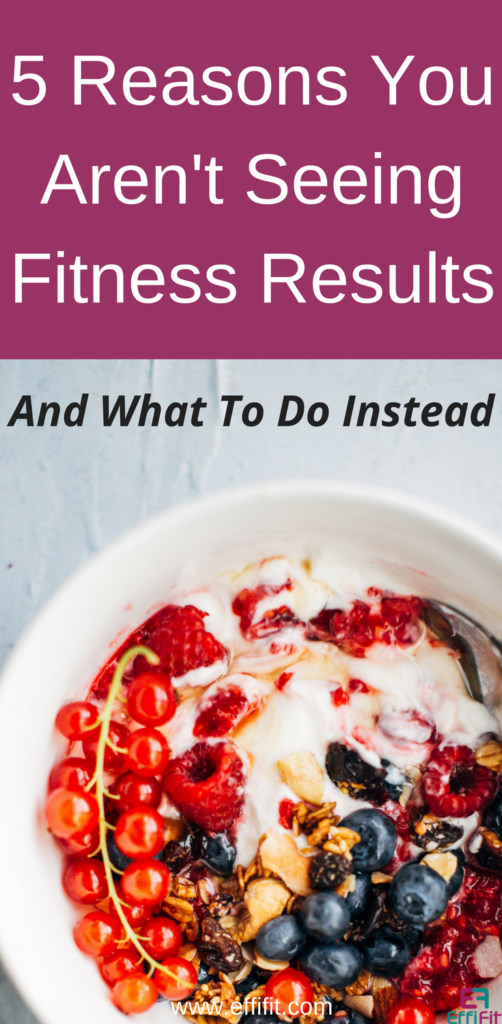
Photo by Jennifer Pallian on Unsplash
You’ve been working your butt off for months now, doing all the things you’re supposed to be doing.
You’re exercising regularly, at least 3 times a week. You’ve cleaned up your eating, cut back on the sweets, bumped up your protein, and are more mindful of your portions. But nothing’s changed, and now you’re ready to give up. Before you do, see if any of these things are getting in your way.
Overtraining
Overtraining is a big one. What have we been taught when it comes to losing weight and getting in shape? Exercise more and eat less. But there is such a thing as exercising too much. Even athletes can overtrain. To the everyday person looking to lose weight and get fit, overtraining may look like: exercising all major muscle groups 7 days a week; running everyday; doing a HIIT workout everyday. Essentially, if you’re working out everyday at a high intensity without taking a rest day, it’s going to catch up to you.
During exercise, we’re tearing our muscles down. But when we rest, this gives our body a chance to repair and get strong. We need the rest to get our body out of breakdown mode. When we’re constantly in breakdown mode, our body is under stress. Stress doesn’t help with weight loss. And to add insult to injury, if you get injured from working out too much, you’ll be on the sidelines and stalling your progress.
So what can you do instead? Build in some rest days. And at least build in one rest day a week. If you’re doing strength training, it’s recommended to train all major muscle groups 2-3 times a week. And then rest at least 24 hours between sessions. So if you do a total body LUCC workout, take a rest day before doing your next one. If you train upper body and lower body on different days, your upper body day will be your rest day for your lower body day and visa versa. That’s one way to workout everyday, a group of your muscles is getting rest daily. If you do HIIT training, give yourself rest in between days. You could do a lower intensity exercise on your off day (walk) or do some flexibility and mobility.
Undereating/overeating
Undereating is a big one. Overeating is a very common one too. Let’s first talk about undereating. Remember how we’ve always been told to exercise more and eat less? Well here we go again. Eating too little will not only hurt your exercise gains and ability to work hard during your workouts, but it can make it really difficult to lose weight. If we aren’t eating enough for activity and goals (even weight loss), our body will hold onto everything we eat. Our bodies are smart and know how to protect themselves.
Women have been told to eat 1200 calories a day to lose weight. But I see major flaws in that. All of our bodies are different. Our fitness goals are different, and the type of exercise we do varies. And while you may see bigger changes and large drops in weight initially, our body will catch on. And then it’s not advisable to drop calories more especially with exercise. Also, if you’re on a program right now where you constantly feel hungry and are fighting hunger pains, email me right now. It shouldn’t be that way.
So what can you do about undereating? Eat more! But not whatever you want or however much. We still need to be mindful of how much and watch our portions. If you’ve been low calorie for awhile, when you start eating more, you are likely going to gain weight temporarily. Your body will still assume you aren’t getting food often and will continue to hold on tight to all the foods. After your body is consistently fed, she will recognize she’s getting the food she needs and will start to let go of what she’s been holding onto. It can be a few weeks or a few months. Try to not be tempted to go back to a low calorie eating plan. It’s going to be hard.
Slowly start adding more food. Increase your intake by about 250 calories (a protein rich snack with veggies or smart carb) every couple weeks. We want to slowly increase intake to limit that weight gain. Fill that increased intake with protein, veggies, smart carbs and healthy fats.
Overeating. It’s time we get honest about how much we’re eating. In general we tend to overestimate exercise and underestimate how much we’re eating. Being honest with our intake is a great first step in figuring out why you aren’t seeing results.
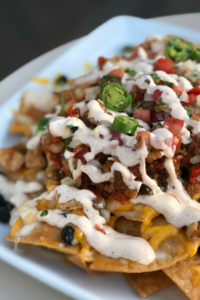
Photo by Natasha Bhogal on Unsplash
Another thing with overeating is overestimating how many calories you burn during exercise. If you haven’t heard it before, let me be the first to tell you, you don’t burn that many calories from exercise. And those calorie burn estimates from your fitness tracker can be off by 30%! I remember in college, I would hit that fat burning zone on the elliptical for an hour (read: the zone where your heart rate doesn’t even go up) and then go to Cafe Rio after for a pork salad that’s 1000+ calories and wonder why I wasn’t getting results. While we do need to eat more depending on our goals and type of exercise, it likely isn’t thousands of calories more.
So what can you do instead? Do a 3 day food record and be honest with yourself. Write down all the food and drinks you eat in that 3 day period, including snacks. Pick 2 work days and 1 weekend day. We eat differently when our days are structured vs not. You don’t have to share with anyone so be honest. It’ll be helpful information for you to determine where you want to start making changes. Also, you don’t need to track for the rest of your life but bits of tracking is helpful here and there. If you need help determining how much to eat, check out this great calorie control guide. I would also love to help you incorporate these portions into your life and make a habit out of it.
Apply for 4 Months to Fit, for a custom workout plan and nutrition strategy!
Other things you can do, slow down when eating. It takes 20 minutes for our brain to recognize that we’re full. Be mindful when eating, limit tv time, phone time, or other distractions while you’re eating. If you aren’t paying attention to eating, you’re going to eat way more. Only eat when you’re hungry. Make note of the other times you eat (stress, boredom, happy, sad) and find different ways to deal with those feelings that aren’t food.
Lack of sleep
Let’s talk about the big one that often gets missed, sleep. If you don’t get your z’s, you’ll really struggle to get results even if you do all the things you should be doing consistently. Why is sleep so important? We need sleep for our bodies to function, there’s no getting around it. And yes, even you that may believe you’re functioning fine on 4-5 hours a sleep. There’s a whole other world out there at 6-8 hours a night. Trust! Lack of sleep consistently hinders your results in many ways. For one, we make poor food choices. When we’re tired, what kinds of foods do we often reach for? Things that give us quick energy. Soda, sugary coffees, donuts, cookies, I think you get the idea.
When clients tell me they have bad sweet cravings, one thing I ask is how much sleep are they getting. Then we talk protein and fats. Lack of sleep also affects our decision making. When we’re tired, we may forget to order the side of veggies with the burger and opt for the giant ass onion rings. Lack of sleep can also be the difference between getting a workout in followed by a well balanced meal or hitting Netflix and takeout. Done consistently, that makes a huge difference in your results. Lack of sleep can also raise your cortisol levels and doesn’t give your body time to rest and recover after a long day or a tough workout.

Photo by Krista Mangulsone on Unsplash
What to do instead? Figure out a way to add 15 minutes of sleep to your current number if you’re not getting enough. This could be leaving work 15 minutes early (especially if you’re already working way more than 40-50 hours a week). This means your after work routine starts 15 minutes earlier! Give yourself a cutoff time for responding to email and checking social media. These are 2 areas we easily lose track of time. You’ll be fine to respond to those emails tomorrow morning at work (which is also great for developing some work life balance).
After a couple weeks, add another 15 minutes of sleep. Keep going until you’re at a place where you feel rested in the morning, which is different from not wanting to get out of bed because of work. If we make too big of jumps in adding sleep, we’ll struggle to get more restful sleep each night. I learned that from my sleep psychologist.
Stress
Chronic high stress doesn’t help you lose weight or get fit. In fact it can have the opposite effect. Cortisol, our stress hormone can contribute to weight gain when in constant high amounts. It can also increase our risk of chronic diseases such as, type 2 diabetes, high blood pressure and heart disease to name a few.
So how do we minimize stress? Start with hacking items off that every flowing to-do list. Simplify it and focus on the essentials. What actually needs to get done? Likely only a handful of things. If you aren’t sure what to keep and what to ditch, ask yourself how necessary is that task for you to be successful each day. Focus on those things. Also, some form of physical activity should be on there at least a few times a week!
Now that we know what’s important, it’s time to use our time wisely to get things done. What distracts you and causes you to be less productive? Is it social media, texts from friends, or feeling you have to answer each email as it comes in. These disruptions cause tasks to take longer because you have to spend additional time getting back in the flow and remembering what you were focusing on. Set times during the day that you will do the aforementioned tasks. Set 2 or 3 times during the work day that you will check and respond to emails. Perhaps turning off that email pop up notification on your computer will be the best thing to happen to you! Consider other productivity tools such as the tomato timer method.
Lastly, take note of your stressors. Which are in your control (being late to work because you hit snooze a few too many times) and which aren’t (a semi truck crashes in front of you on the way to work)? Stop stressing about the things you can’t control. Easier said than done but much better for your health and well-being.
** A little tough love: set boundaries and stick to them. There’s a big difference in being busy vs being productive. Remember in high school and college, we’d complain about all the busy work. Do less busy work and get more sleep. The word No is your best friend.
Mindset
Mindset matters. Even when it comes to fitness and weight loss. And how you view things makes all the difference. If you see exercise as punishment and food as something to be afraid of, it’s going to be really hard to make changes and improve your health and body each day. We tend to avoid things that are negative and not enjoyable. If eating well and exercising are things we see as negative, we won’t want to do them.
How you talk to yourself throughout the process is something to keep in mind too. Are you often negative and say rude things to yourself thinking that will motivate you? If so, how’s that been working for you? If not well, it’s time to think and talk to yourself in a different way that will allow you to be successful and to achieve your goals long term. When we focus so much on the negative we get more of the negative. And that doesn’t help us progress and move forward in any aspect of your lives.
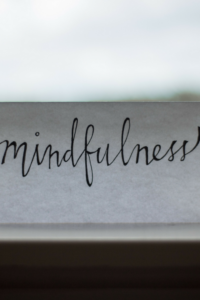
Photo by Lesly Juarez on Unsplash
So what do you do instead? Flip that script. Look for the positives. Find exercise you enjoy (it doesn’t have to be the most intense workouts, it could be as simple as walking daily, doing yoga, or even some bodyweight exercises at home). If you don’t like something, it’s hard to keep doing it. If you do have specific goals, those goals may require you to do some exercise or activity that isn’t your favorite, but hopefully that isn’t the only thing you are doing.
When you’re working out, change your reason for working out. If it’s been to make up for overeating/drinking, to get rid of the jiggle, or so your thighs don’t touch, you’re going to really struggle to see exercise for all its benefits. But if you think of exercise as a way to get stronger, a way to boost your confidence (because you do something challenging and come out on top each time), or as a way to improve your health so you can tackle life head on, then you’re going to really enjoy exercise and what it brings to the table.
View food as fuel and how it gives you energy and helps you reach your goals. We need food. So don’t restrict it and make yourself miserable. That’s how people quit living a healthy lifestyle. Keep it simple, and just enjoy your food. If you want to get strong and lose weight, you’re going to have to eat. Also there’s not good or bad foods. There are foods that help you reach your goals better compared to others. The type of food you eat doesn’t make you a good or bad person. Food is food and has no morality. Same goes for exercise, working out or not working out doesn’t make you a good or bad person.
The most important thing you can do from the start is to love your body from day one and what it does for you. Don’t wait until you reach your goal to then love yourself and your body. Sure you want to improve it, and I think that’s great. But recognize and be grateful for the things your body is already doing for you, like keeping you alive.
There are many reasons that can be stopping you for reaching your weight loss and fitness goals, but here are 5 to start working through. My advice, start with one, focus on it for a month. Note any changes. Then add another until you find your missing piece.
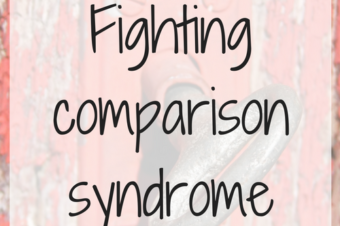


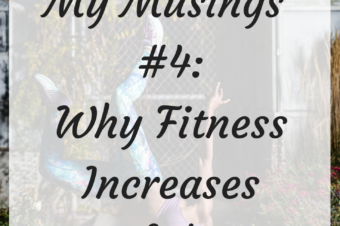

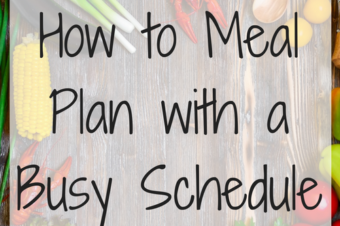
4 Responses
Laurie
Hi Atim… I LOVE this post/article! While I’m not looking to lose weight, I’m looking to be healthier in what I do. I think you were talking DIRECTLY to me about balance in all of these areas – especially about overeating (the snacky foods) and lack of sleep (do naps count?). I’m almost afraid to make the food diary – although I’m always on the go, I seem to be stuffing a little something into my mouth every 2 hours. Thank you for giving me, er, “food for thought”. Bad, I know. 🙂
Atim Effiong
Laurie, I’m so glad to hear you found this helpful! I’m a big fan of one thing at a time. So if it isn’t food yet, then maybe working on that lack of sleep first. Then facing the food diary head on. We won’t know what going on until we really see what’s going on. 🙂
Kristin Hannah The Great Alone ebook
Helpful info. Lucky me I discovered your site by accident, and I am stunned why this
accident did not came about earlier! I bookmarked it.
Atim Effiong
Glad to hear it’s helpful! Stay tuned for more good content.